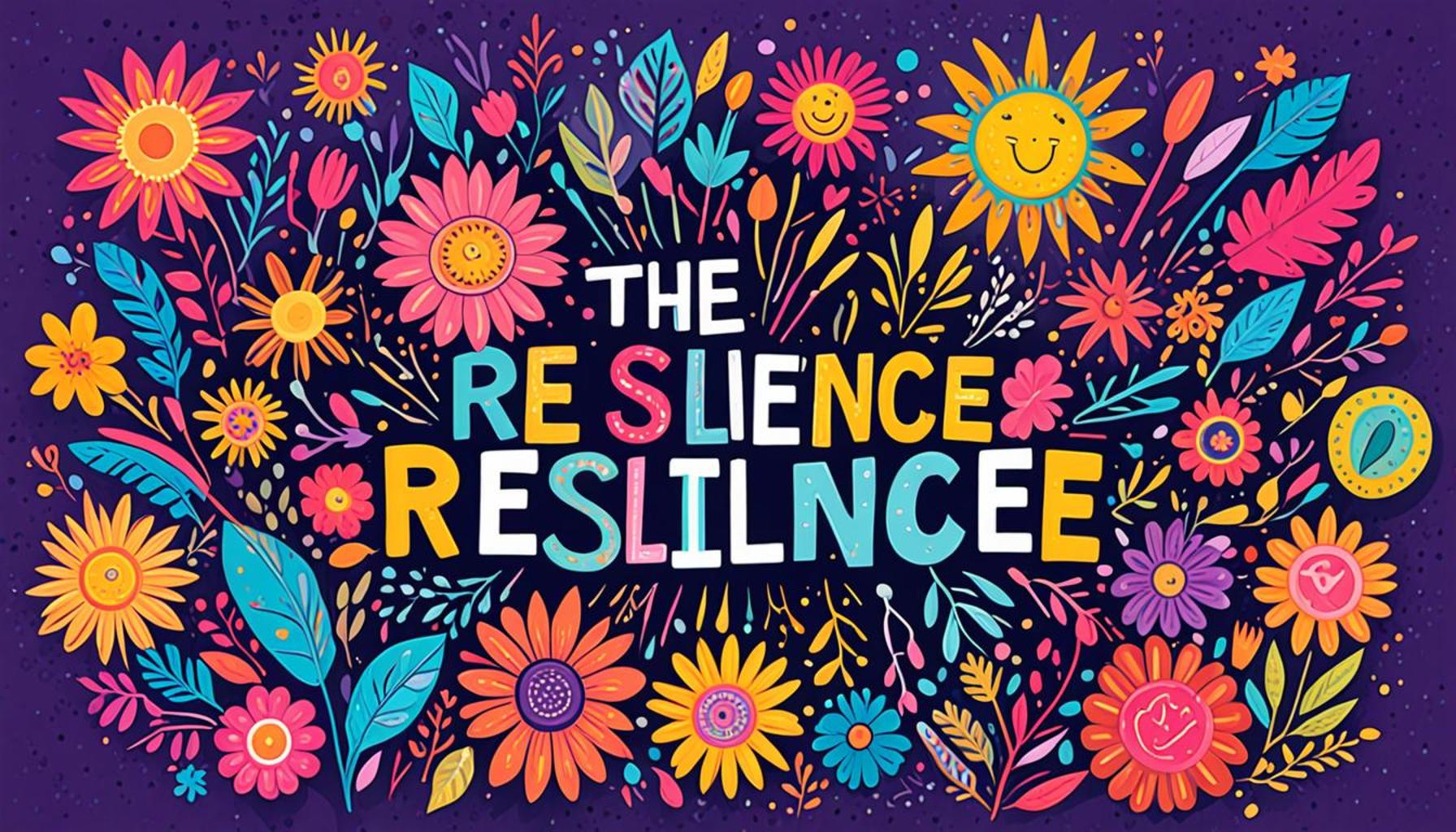Transforming Challenges into Opportunities: The Influence of Affirmations on Professional Resilience

The Role of Affirmations in Building Professional Resilience
In an era characterized by swift changes and unpredictability, the ability to confront challenges resolutely is essential for anyone wishing to thrive in their career. The landscape of jobs in Nigeria, for example, is often marked by economic volatility, which can lead individuals to experience heightened levels of anxiety and self-doubt. This is where the practice of using affirmations becomes invaluable. These positive statements act as a mental framework that not only helps to bolster an individual’s mindset but also transforms daunting obstacles into manageable opportunities.
Understanding Affirmations and Their Impact
Affirmations are more than mere phrases; they represent a form of self-encouragement that can significantly shift one’s perspective. By consistently repeating affirmations, individuals can cultivate a mindset that embraces positivity and fosters growth. For example, a professional in Nigeria might say, “I am capable of overcoming challenges,” which reinforces their self-belief during trying times. This declaration serves as a mental shield that defends against negative thoughts, thereby promoting resilience.
- Encouraging a Positive Outlook: When faced with challenges, the tendency may be to feel overwhelmed. However, affirmations reframe these situations, pushing individuals to view them as opportunities for growth rather than insurmountable barriers.
- Boosting Self-Confidence: Often, individuals underestimate their capabilities. Regularly using affirmations, like “I possess the skills needed to excel,” can reinforce confidence and instill a deep-seated belief in one’s abilities.
- Creating a Proactive Approach: Instead of succumbing to fear or passivity, affirmations such as “I will take action to solve this problem” encourage individuals to adopt a proactive stance, enabling them to address challenges head-on.
The Context of Nigeria’s Job Market
In Nigeria, the job market poses unique challenges that often exacerbate stress and uncertainty. The nation faces precarious economic fluctuations that can lead to job losses or the slow growth of careers. Many professionals also contend with limited resources for skill development, coupled with competitive work environments that demand constant growth to stay relevant.
- Economic Fluctuations: Rapid changes in the economy can lead to unstable job security, making it imperative for employees to cultivate resilience. Affirmations can provide the emotional fortitude needed to navigate these turbulent waters.
- Limited Resources: With educational institutions often underfunded and opportunities for upskilling scarce, affirming one’s own ability to learn and develop can motivate individuals to seek knowledge independently.
- Workplace Challenges: Stressors such as competition and emotional pressures in the workplace require a robust mentality. Affirmations can play a pivotal role in maintaining morale and focus amidst a high-pressure environment.
Conclusion
Incorporating affirmations into daily practices can equip individuals not only to confront immediate challenges but also to prepare for continued success in their professional journeys. As they reframe failures as launching pads to future achievements, they simultaneously build a sturdy foundation of resilience. In a world of uncertainties, the proactive use of affirmations can transform the approach to both personal and professional tribulations, ultimately leading to a more fulfilling career trajectory.
LEARN MORE: This related article may interest you

Harnessing the Power of Affirmations for Professional Growth
In the face of daunting challenges, the strength of one’s mindset can make all the difference. Within Nigeria’s increasingly challenging job market, where economic instability frequently poses hurdles to career advancement, the concept of affirmations emerges as a beacon of hope. By consciously choosing to affirm one’s capabilities and potential, professionals can unlock an enhanced sense of resilience, allowing them to navigate the complexities of their work environments with greater ease and confidence.
How Affirmations Fuel Professional Growth
Utilizing affirmations is not simply about positive thinking; it involves a profound reprogramming of the mind. By repeatedly engaging with empowering phrases, individuals can cultivate neural pathways that reinforce positive beliefs about themselves and their abilities. For instance, a Nigerian entrepreneur facing the uncertainty of starting a new business might repeat, “I am capable of achieving my goals,” reinforcing their determination and clarity of purpose. This mental reinforcement can lead to practical actions that align with those beliefs.
- Reframing Adversity: In a country where challenges can easily become overwhelming, affirmations help professionals shift their perspective. They encourage individuals to view setbacks not as the end of the road but as opportunities to learn and grow.
- Encouraging Adaptability: The job market in Nigeria often shifts rapidly, requiring professionals to be flexible and adaptable. Affirmations such as “I can adapt to any situation” instill a mindset ready to pivot when circumstances change, leading to better problem-solving skills.
- Fostering a Growth Mindset: Utilizing affirmations can also encourage a belief in lifelong learning. Repeating statements like “I am constantly improving” can motivate individuals to seek knowledge and skills even in the face of scarcity of resources, pushing them to think beyond traditional boundaries.
The Psychological Framework Behind Affirmations
The effectiveness of affirmations is rooted in psychological principles that highlight their role in enhancing self-esteem and reducing stress. Cognitive Behavioral Therapy (CBT) has long emphasized the importance of challenging and reshaping negative thought patterns. Affirmations serve as tools to help individuals combat self-doubt and anxiety, providing a tangible means of self-empowerment.
Moreover, the regular practice of affirmations can lead to the creation of a resilient identity. In a high-pressure work environment, where the stakes are constantly shifting, individuals armed with a strong belief in their capabilities are more likely to take calculated risks. For example, a professional in a competitive field may remind themselves, “I am worthy of success and will pursue opportunities without fear.” This breeds not only resilience but also a proactive approach to career development.
As the conversation around mental health and workplace wellness continues to gain traction in Nigeria, the integration of affirmations into professionals’ daily routines is an innovative approach worth considering. By prioritizing this practice, individuals can expect greater control over their responses to stressors, thus enhancing their overall professional trajectory.
The Mechanism Behind Affirmations
Affirmations play a pivotal role in fostering professional resilience by reprogramming the subconscious mind. By repeating positive statements about oneself, individuals can cultivate a more optimistic outlook towards challenges. This process helps in enhancing one’s self-esteem and self-worth, which are crucial in navigating professional hurdles.
Psychological Insights
Research in psychology emphasizes the significance of a growth mindset, where individuals view challenges as opportunities for growth rather than insurmountable obstacles. Integrating affirmations into daily routines can shift one’s perspective towards a more constructive approach in the workplace. Studies have shown that individuals who regularly engage in affirmations report lower levels of stress and higher motivation levels, thus enhancing overall job performance.
Creating a Positive Work Environment
Affirmations are not only beneficial on an individual level; they can also transform team dynamics. When team members embrace affirmative practices, it fosters collaboration, trust, and positive communication. Organizations that promote a culture of affirmation often find their workforce more engaged, innovative, and resilient in the face of challenges. This cultural shift leads to improved organizational resilience and contributes to higher retention rates among employees.
Practical Implementation
Incorporating affirmations into a daily routine can be remarkably simple. Professionals can start their day by reciting affirmations that resonate with their goals and values. Additionally, group affirmation sessions can be beneficial in team meetings, reinforcing a shared positive mindset. As organizations recognize the profound impact of positive affirmations, integrating them within professional development programs becomes increasingly essential.
Affirmations as a Tool for Continuous Growth
The journey of transforming challenges into opportunities is ongoing. Affirmations serve as a powerful tool for continuous growth, encouraging individuals not only to overcome obstables but the proclivity to thrive amidst chaos. By actively engaging with affirmations, professionals can ensure they remain equipped with the psychological resilience needed to excel in their careers.
YOU MAY ALSO LIKE: Read read another article
Building a Resilient Workforce Through Affirmations
The concept of resilience is crucial as professionals in Nigeria continue to face multifaceted challenges, ranging from economic downturns to intense competition. Affirmations can play a pivotal role not only in individual growth but also in the broader context of fostering a resilient workforce. By integrating affirmations into corporate culture, organizations can cultivate an environment that supports employee well-being and enhances overall performance.
Creating a Culture of Positive Reinforcement
Employers who encourage the practice of affirmations among their teams create a ripple effect that contributes to a more engaged and productive workplace. Research indicates that positive reinforcement boosts morale and promotes collaboration, essential ingredients for any thriving business. For instance, consider a telecommunications company in Nigeria that implements an ‘Affirmation of the Week’ program. This initiative encourages employees to share affirmations that resonate with them, promoting a sense of unity while also reinforcing individual strengths.
- Enhancing Team Dynamics: When employees share their affirmations, they open a dialog about personal strengths and challenges, fostering deeper connections within teams. This collaborative support allows professionals to bolster each other’s resilience, transforming isolated challenges into shared experiences that can be tackled collectively.
- Reducing Burnout: In high-pressure environments, such as those in the finance or oil sectors in Nigeria, stress and burnout can be significant concerns. Affirmations that focus on self-care and balance, including statements like “I prioritize my well-being,” can serve as reminders for individuals to take necessary breaks, ultimately improving long-term productivity.
- Promoting Innovation: A workforce that believes in its capabilities is more likely to embrace change and innovation. By affirming statements such as “I am an innovator,” employees can feel empowered to explore unconventional ideas, creating a more dynamic workplace that adapts to market needs.
The Role of Leadership in Affirmation Practices
For affirmations to take root within an organization, leadership plays a crucial role in modeling this practice. Leaders who embody and preach the benefits of affirmations create a trickle-down effect, influencing how teams perceive challenges. A Nigerian manager who openly shares their affirmation journey, perhaps stating, “I lead with confidence and clarity,” demonstrates vulnerability and encourages employees to adopt similar practices.
Moreover, integrating affirmations into professional development programs can enhance skills training sessions. By setting aside time for affirmation exercises, businesses can equip employees with the mental tools to face challenges head-on and pursue their goals fearlessly. This approach not only equips individuals with coping mechanisms but also aligns personal aspirations with the organization’s mission, fostering employee loyalty.
Ultimately, the integration of affirmations into both personal and professional contexts can create a robust foundation for resilience amidst Nigeria’s fluctuating economic landscape. By emphasizing the importance of positive self-affirmation, companies can create a workforce that is not only capable of weathering storms but also actively seeking opportunities for growth and advancement.
YOU MAY ALSO LIKE: Read read another article
Conclusion: Harnessing the Power of Affirmations for Professional Resilience
In navigating the complex landscape of Nigeria’s professional environment, the role of affirmations in fostering resilience cannot be overstated. By integrating positivity into daily practices, individuals and organizations alike can convert the challenges they face into opportunities for growth. As we explored, affirmations do more than boost individual morale; they herald a cultural shift within workplaces that transforms attitudes towards adversity.
Creating a supportive environment where affirmations are not only encouraged but celebrated can drastically enhance team dynamics and innovation. The evidence shows that organizations committed to positive reinforcement see improved employee engagement and productivity, paving the way for sustainable success. As leaders embody this practice, they not only set a powerful example but also cultivate a climate in which resilience flourishes.
Looking ahead, organizations that prioritize affirmations may find themselves reaping the benefits of a motivated, innovative workforce that is better equipped to tackle setbacks with courage and creativity. The call to action for Nigerian businesses is clear: adopt and nurture affirmation practices, for they are pivotal in building not just resilient individuals but an agile and thriving professional landscape. By doing so, they position themselves not only to endure economic fluctuations but also to emerge stronger and more capable than ever.


